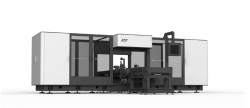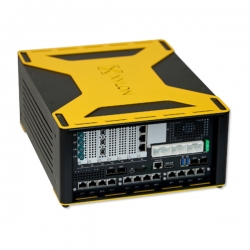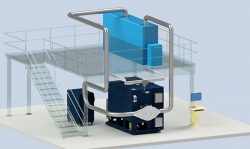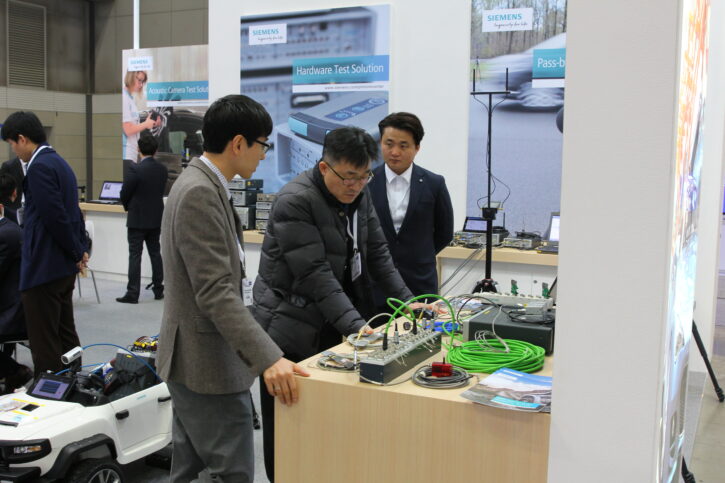Returning for the first time since 2019, the South Korean edition of the world’s largest automotive testing technology exhibition will take place at the Korea International Exhibition Center (KINTEX) in Seoul on March 20, 21 & 22. Automotive Testing Expo Korea 2024 will bring together an array of new technologies to upgrade and accelerate your testing, vehicle development and verification projects. Register for your free exhibition entry pass here.
The exhibition
Improving the quality of vehicles for various markets, local or global, does not come without its challenges. The integration of advanced computing systems and ADAS technologies, along with the shift toward electric vehicles, add to the complexity of this endeavor.
Automotive Testing Expo Korea is the premier global event focused on reducing recalls, improving the success rate of new technologies and accelerating the development of intricate vehicles within shorter timeframes.
With more than 100 leading suppliers participating, the expo showcases technologies and services essential for ensuring the highest standards in product quality, reliability, durability and safety throughout the testing, development and validation processes.
Attendees have the opportunity to meet with both new and established specialist suppliers in one location, facilitating streamlined decision making and the implementation of cost-effective testing solutions.
Exhibitor highlights will include e-mobility and powertrain testing solutions; power analyzers; HIL software; vehicle and machine testing and monitoring; as well as emissions testing and code testing, measurement and calibration, and networks and distributed systems.
 ADT which provides test solutions for automotive powertrains, will exhibit testing equipment for new energy sources such as fuel cells, hybrid powertrains and battery electric vehicles.
ADT which provides test solutions for automotive powertrains, will exhibit testing equipment for new energy sources such as fuel cells, hybrid powertrains and battery electric vehicles.
Hioki Korea will showcase its power analyzer PW8001 and non-contact CAN sensor SP7001 and SP7002, solutions optimized for electric vehicles. According to the company, the power analyzer PW8001 capabilities include ±0.03% basic accuracy, ±0.05% DC accuracy, as well as 50kHz accuracy 0.2%. The non-contact CAN sensor SP7001 and SP7002 has a wide operating temperature, designed to reduce man-hours.
 Xylon is set to show its logiRECORDER automotive HIL video logger, which can play back realistically restored recorded sessions, while simultaneously recording the DUT’s responses. Playback data is electrically and logically formatted to fully correspond with the requirements of the internal busses of an operational vehicle driving along the road. This replicates the test vehicle’s complete multi-camera video system and in-vehicle data busses on a developer’s desk.
Xylon is set to show its logiRECORDER automotive HIL video logger, which can play back realistically restored recorded sessions, while simultaneously recording the DUT’s responses. Playback data is electrically and logically formatted to fully correspond with the requirements of the internal busses of an operational vehicle driving along the road. This replicates the test vehicle’s complete multi-camera video system and in-vehicle data busses on a developer’s desk.
Vector Korea’s three product lines, Code Testing, Measurement & Calibration and Networks & Distributed Systems, will be showcasing new tools at the expo that enable interoperability between each product. The VectorCAST embedded software testing platform is a family of products that automates testing activities across the software development lifecycle. The company works with clients’ existing software development tools to enable continuous and collaborative testing.
 Link Engineering provides a range of capabilities for testing brake emissions on passenger cars, commercial vehicles and rail applications. Depending on the testing needs, emissions features can be provided to conventional brake dynamometers (performance or NVH), retrofit of existing brake dynamometers or dedicated brake emissions testers. On show will be Link’s Brake Emissions Pro and Pro+ dynamometers which are designed to meet the upcoming Euro regulation, UN GTR-GRPE 2023/4 requirements and beyond.
Link Engineering provides a range of capabilities for testing brake emissions on passenger cars, commercial vehicles and rail applications. Depending on the testing needs, emissions features can be provided to conventional brake dynamometers (performance or NVH), retrofit of existing brake dynamometers or dedicated brake emissions testers. On show will be Link’s Brake Emissions Pro and Pro+ dynamometers which are designed to meet the upcoming Euro regulation, UN GTR-GRPE 2023/4 requirements and beyond.
Technical presentations
The event also features a free-to-attend Technology Presentation Stage, offering insights from industry experts representing OEMs, Tier 1 and Tier 2 manufacturers, suppliers and research institutions, further solidifying the expo’s status as an indispensable platform for the automotive testing, evaluation and quality engineering industry.
Featured presentations will cover topics such as AI validation for automotive systems; VIL testing for ADAS and AD functions; analysis of electrical power and efficiency in road tests and on test benches, and the importance of torque vectoring in modern vehicle architectures to tune the driving behavior of EVs.
Jong-Yeol Park, a manager at Techways, will give a presentation about in-cabin automotive systems that aid the safety of drivers and passengers. Titled “AI tales from the cabin – from data harvesting to full AI validation with Xylon”, the presentation will discuss how AI systems must monitor humans and recognize their behavior. Park will outline the technological challenges of in-cabin data capturing in labs and remote test fleets, and discuss the ways to overcome the issues, such as heterogeneous sensory setups, ground truth and training data sets development, neural networks optimization and HIL simulation.
With AI a prevalent topic in the industry, Minhyuk Kwon, director of intelligent test automation at Suresoft Test Automation Research Institute, will give a presentation on trends in activities to increase the trustworthiness and dependability of artificial intelligence systems in the automotive industry. During the discussion, Kwon will introduce an AI model adversarial testing evaluation tool that identifies and improves vulnerabilities in AI systems, to contribute to the development of safer and more reliable automotive technologies.
Deugsu Byun, head of the smart mobility business division at Innosimulation, will assess vehicle-in-the-loop (VIL) as a testing method for the safety of ADAS and AD functions at a vehicle production level. The testing technique involves integrating actual production vehicles into a virtual environment to evaluate and enhance the performance of the vehicle’s systems and software. It is considered a crucial step in the automotive development process.
Vector Korea business development manager Daehwan Kim‘s presentation will analyse electrical power and efficiency in road tests and on test benches. The development of electric vehicles requires optimization of both the power electronics and the ECU application. Derived values such as active power, the efficiency of inverters, electric motors, converters or charging systems are important. With Vector’s e-mobility measurement technology, as Kim will explain, ECU internal values can be measured and adjusted, along with analog measurement signals that can be synchronously acquired and analyzed.
Hyangseol Cho, manager at Magus Technology, is set to evaluate AB Dynamics’ GTC system for autonomous driving safety verification and performance validation. AB Dynamics’ system provides an environment that simulates realistic traffic scenarios, including worst-case situations, which facilitates proactive safety confirmation and performance validation assessments for autonomous vehicles.
Please visit www.testing-expokorea.com for the full exhibitor list, product areas, and to register for your free exhibition entry pass.


